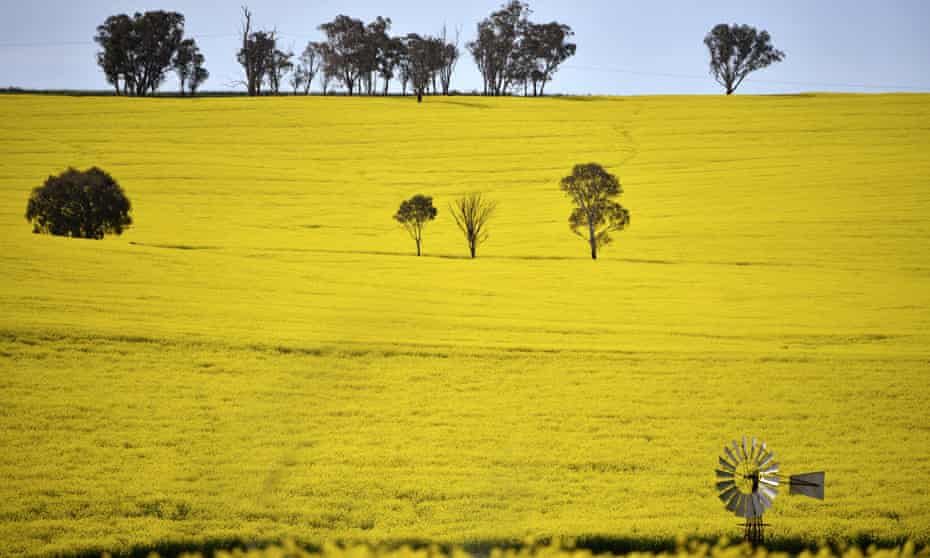Federal funding for Australian farmers could be open to environmental challenge, experts warn
Amid call for land-clearing law reparation, lawyers say global agreements may not always permit such assistance

Last modified on Wed 13 Oct 2021 22.17 EDT
Constitutional lawyers and environmental groups have warned federal agriculture funding could be open to challenge if it appears to support measures that are inconsistent with international environment agreements.
The National Farmers Federation has called for a dedicated income stream as reparation for state land-clearing laws in the 1990s, as the Morrison government tries to secure a climate policy ahead of Cop26 in Glasgow next month.
But the constitutional law expert Prof George Williams said that under the constitution, the commonwealth may not have the power to fund agriculture or water unless the money goes via the states, which means it has very limited direct funding capacity.
“So typically it will rely on those international agreements around biodiversity and the like to provide that funding, but that may not always permit the funding the commonwealth wants to give,” Williams said.
The 2019 Future Drought Fund bill, for example, outlines potential measures under Australia’s international obligations related to the Desertification convention, the Climate Change convention, the Ramsar convention and the Biodiversity convention, among others.
“It may be the funding needs more of an environmental bent than an economic bent, for example,” said Williams.
“That’s one of the reasons the Murray Darling Basin issue has been so fraught is because the commonwealth needs to work its way through these arrangements rather than just doing what it would like to do.”
Williams said the “awkward” nature of agriculture funding created potential for a chaplain style funding case, in which the Abbott government’s national school chaplaincy program was ruled invalid by the high court.
“If the commonwealth starts funding things and regulating things over which it doesn’t have a head of power, then that could be challenged and potentially struck down,” Williams said.
Anne Twomey, professor of constitutional law at Sydney University, agreed that federal government funding for agriculture relied on “convenient treaties” for some programs unless the commonwealth funded via the states.
“There’s no reason for them not to go through the states other than that they get more credit by doing it directly,” Twomey said.
But she warned court challenges to the commonwealth funding validity were highly risky and potentially very expensive.
A number of farmers, primarily in Queensland and northern New South Wales, have long complained that they lost property rights when state land-clearing laws were enacted in the 1990s.
The Nationals leader, Barnaby Joyce, who is currently negotiating the climate policy with Scott Morrison, has backed the NFF’s claims that farmers should be compensated.
Though the state land-clearing laws came into effect before the federal climate negotiations for the Kyoto agreement in the 1990s, the Howard government banked state-based emissions reductions to ensure other industries such as fossil fuels or manufacturing were not affected by Australia’s climate commitments.
Tim Beshara, policy manager at the Wilderness Society, said it wasn’t clear whether agriculture bodies were happy to “draw a line in the sand” on broadscale land clearing and the biodiversity impacts that go along with it.
“[Climate negotiations] shouldn’t have to be a version of ‘give me money or the koala gets it’,” he said.
“[Farmers] want to claim the credit for stopping clearing since the 90s and also for the carbon they have on their properties now, but they don’t want to be forced to put the bulldozer away and they definitely don’t want to have to pay for the carbon debt that they built up over the previous decades of clearing.”
The agriculture minister, David Littleproud, has claimed it is the states’ responsibility to compensate farmers, though Queensland and NSW have not commented on his suggestion.
He said states received nearly $350m through the National Heritage Trust for the Bushcare program, funded from the sale of Telstra.
The NFF’s call means a section of the farming industry is simultaneously asking for land-clearing compensation, while looking to expand environmental programs to pay farmers as land stewards. Littleproud has already rolled out pilots in carbon, biodiversity and remnant vegetation.
Fiona Davis, CEO of Farmers for Climate Action, said some farmers felt unfairly treated under the Kyoto agreement but it was important to look forward to environmental service programs such as the expansion of the enhanced remnant vegetation pilot.
“We think it’s important that farmers are rewarded for the positive flow-on effects of work on farm particularly around biodiversity and that the pilot puts a financial value on native vegetation for farmers,” Davis said.
The National Farmers Federation’s $100bn agriculture plan aims to have 5% of farmers’ income from environmental service payments by 2030.
Beshara, who is a former CEO of NSW Landcare, said the Coalition had repeatedly cut environmental expenditure while there had been numerous funding schemes announced to support farmers.
“Little of the funding has ended up being spent on environmental outcomes. Australia has some of the highest biodiversity values in the world. We also have one of the world’s highest species extinction rates,” Beshara said.
“The agriculture industry draws its income from over 50% of our landmass, so unless that industry raises its environmental standards, then biodiversity decline here is inevitable.”
But he predicted the environment movement would back support to the farming sector to maintain global competitiveness in exchange for a real and permanent transition to higher environmental standards.
This could happen, he said, by embedding environmental policy into the classic trade and industry assistance role of the government.
Beshara said it was inevitable that global markets and the world’s finance system would require Australia “to get our act together” on environmental standards.
“They bloody well know this and this is why it’s so disappointing watching them take a reactionary position fighting a fight from a generation past.”
The National Farmers Federation was approached for comment.

